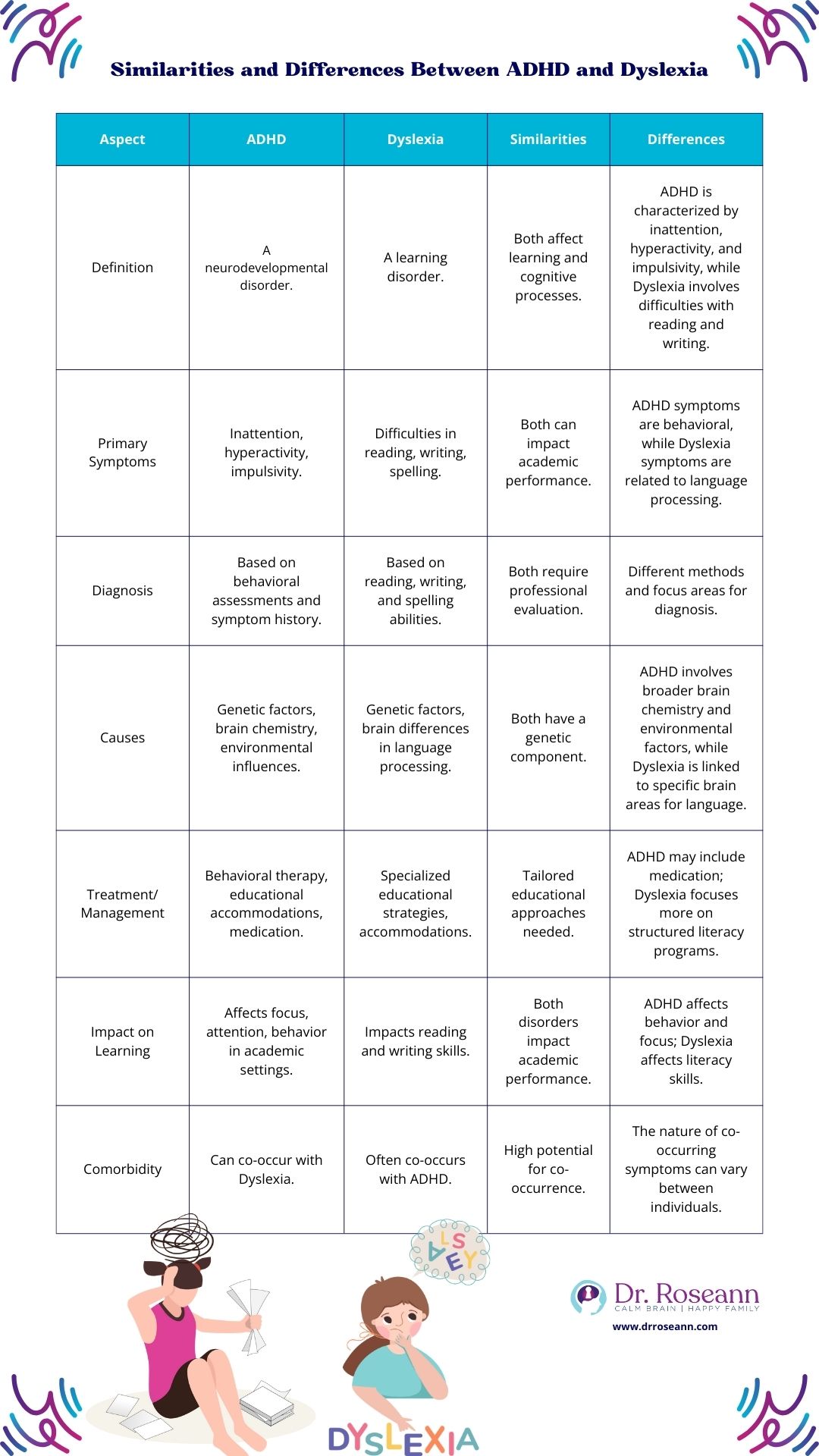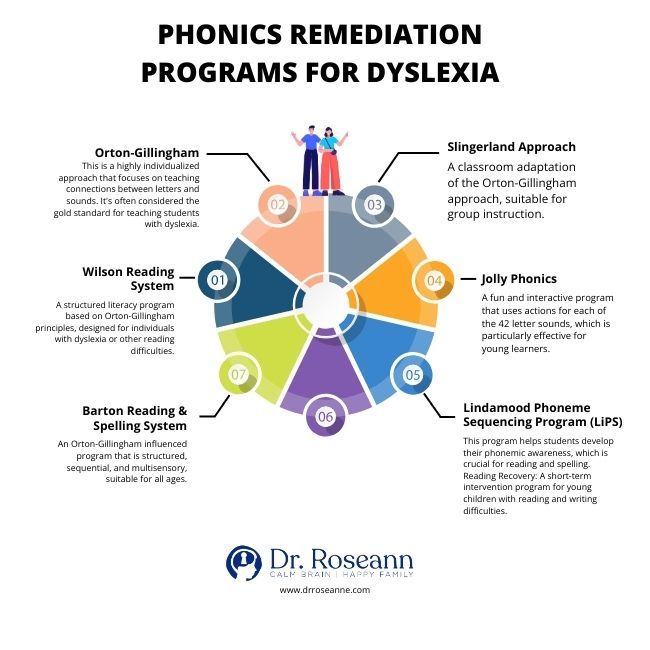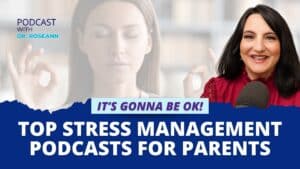There is an intricate relationship between Attention Deficit Hyperactivity Disorder (ADHD) and Dyslexia. ADHD, a neurological disorder, manifests through symptoms such as inattention, hyperactivity, and impulsivity, affecting various aspects of life, from school performance to social interactions. Dyslexia, on the other hand, is a specific learning disability, primarily characterized by difficulties in reading, writing, and spelling, despite adequate intelligence and learning opportunities. While these conditions are distinct, their paths often intersect, leading to a phenomenon known as comorbidity.
Having spent my entire three decade career supporting children with ADHD and dyslexia, I know just how common the two co-occur.
Understanding ADHD and Dyslexia
ADHD and Dyslexia: Defining the Conditions
ADHD, a well-known behavioral disorder, is often identified by its core symptoms of ADHD, including inattention, hyperactivity, and impulsivity. These symptoms can significantly impact a child's academic performance and social interactions.
Dyslexia, a reading disability, hinders the ability to read fluently and accurately, often leading to reading problems that persist despite conventional teaching methods. It's a specific learning disability that goes beyond general learning difficulties, requiring specialized interventions.
Prevalence and Diagnosis Challenges
Dyslexia is more common than many realize, affecting a significant portion of the population. The prevalence of dyslexia varies, but it's a widespread challenge in the realm of learning disabilities. Similarly, ADHD is a prevalent condition, often co-occurring with dyslexia, leading to a dual diagnosis of ADHD dyslexia.
However, diagnosing these conditions can be complex. Misdiagnosing dyslexia or ADHD can lead to ineffective treatment approaches. It's crucial to understand that dyslexia is not a mental illness but a learning disability requiring specific educational strategies.
The Link Between ADHD and Dyslexia
Common Symptoms and Challenges
Children and adolescents with dyslexia often face reading difficulties that are sometimes mistaken for inattention or lack of effort, symptoms commonly associated with ADHD. These reading problems can be attributed to issues with phonological processing, working memory, and processing speed, all of which are critical in learning to read and write effectively. Similarly, individuals with ADHD may struggle with maintaining attention during reading tasks, further complicating their learning process.
Evidence of Comorbidity
Numerous studies have shown a significant overlap between ADHD and Dyslexia. Research indicates that children with ADHD are more likely to experience reading difficulties, and conversely, individuals with dyslexia often exhibit symptoms characteristic of attention deficit hyperactivity disorder.
On one meta analysis, studies showed the common presence of executive function deficits in children with dyslexia (Lonergan et al., 2019).
This comorbidity suggests a shared underlying mechanism, possibly genetic or neurobiological, that contributes to both conditions. Understanding this connection is crucial for developing effective treatment and support strategies for those affected by both ADHD and Dyslexia.
Phonological Processing and Its Role
Understanding Phonological Processing
Phonological processing, a key aspect in the realm of learning disabilities, plays a crucial role in how individuals with Dyslexia process language. It involves the ability to recognize and manipulate sounds in spoken language, an essential skill for reading and spelling.
In Dyslexia, difficulties with phonological processing lead to a reading disorder, where decoding words becomes a significant challenge. Core dyslexia symptoms involve difficulties with phonological processing, phonological memory, and rapid automatized naming.
Similarly, with those with dual ADHD and dyslexia, impaired phonological processing can contribute to behavioral disorders, as difficulties in processing language can lead to frustration and behavioral issues in academic settings.
Impact on ADHD and Dyslexia
For individuals with Dyslexia, the core issue often lies in phonological processing deficits, directly affecting their ability to read and spell. This struggle goes beyond simple reading problems, manifesting as a complex reading disorder that requires specific interventions.
In the case of ADHD, while the primary symptoms may not directly relate to phonological processing, difficulties in this area can exacerbate attention issues, particularly in tasks that require language processing, such as reading and writing. Understanding the role of phonological processing is key to addressing the unique challenges presented by both ADHD and auditory dyslexia.
Similarities and Differences Between ADHD and Dyslexia

Educational Challenges and Support Strategies
Navigating Educational Challenges
Students with the comorbidity of ADHD and Dyslexia face a unique set of educational challenges. They may exhibit defiant disorders in response to academic frustrations, particularly when their learning needs are not adequately met.
A student with dyslexia often struggles with reading and spelling, which can be mistaken for inattention or lack of effort, common misconceptions about ADHD. Additionally, ADHD can manifest as difficulty reading, where sustaining attention during reading tasks becomes a significant hurdle.
Strategies for Support and Improvement
Addressing the needs of students with both ADHD and Dyslexia requires a multifaceted approach. Recognizing that these conditions constitute specific learning disabilities is the first step. For dyslexia learning disability, structured literacy programs that focus on phonemic awareness, phonics, fluency, vocabulary, and comprehension can be highly effective.
These programs should be tailored to address the unique challenges of dyslexia, such as difficulties with decoding and encoding words. There are also dyslexia programs at home where parents can support what their child is doing at school.
For students with ADHD, strategies to enhance focus and reduce distractions are vital. This might include preferential seating, shorter work periods, and the use of assistive technology. Incorporating multi-sensory learning techniques can also be beneficial, as they engage multiple senses and can help in retaining attention.
Collaboration between educators, parents, and specialists is crucial in developing an Individualized Education Plan (IEP) or 504 Plan that addresses both the ADHD and dyslexia learning disability. Accommodations might include extra time on tests, oral exams, or the use of text-to-speech software. Regular monitoring and adjustments to these plans ensure that they continue to meet the evolving needs of the student.
Understanding and addressing the educational challenges of students with ADHD and Dyslexia involves a comprehensive approach that combines specific strategies, accommodations, and collaborative efforts among all stakeholders involved in the student's education.
Misdiagnosis and Its Consequences
The Impact of Misdiagnosis
Misdiagnosis is a significant concern in the realm of learning disabilities, particularly when distinguishing between Dyslexia and ADHD. Misdiagnosing dyslexia as ADHD or vice versa can lead to inappropriate interventions that fail to address the root of the problem.
For instance, a child struggling with dyslexia might be mistakenly diagnosed with ADHD due to inattentive behavior during reading tasks. Conversely, ADHD symptoms might be overlooked in a child with dyslexia, attributing their challenges solely to their reading disorder. This confusion can lead to a cycle of frustration and inadequate support for the child.
The Importance of Accurate Diagnosis and Early Intervention
Accurate diagnosis is crucial for effective intervention. Parents seeking clarity on their child's challenges should consider consulting with specialists, searching for ‘dyslexia doctors near me' or ‘ADHD and dyslexia testing near me' to find qualified professionals. Early intervention following a correct diagnosis can significantly improve outcomes for children with either or both conditions.
Tailored educational strategies, behavioral therapy, and, in some cases, medication can be employed to address the specific needs of the child. Early intervention not only aids in academic achievement but also in building self-esteem and coping skills.
Genetic Factors and Family History
Exploring Hereditary Links
The hereditary nature of both ADHD and Dyslexia is a critical area of study. Research indicates that both conditions can run in families, suggesting a genetic component to their development. Understanding family history is therefore an important aspect of diagnosing and managing these conditions.
Parents who have a history of either ADHD or Dyslexia should be mindful of the signs in their children. The question of ‘does dyslexia run in families?' is particularly relevant, as a positive family history can be a strong indicator of the child's risk. Similarly, ADHD is often observed in multiple family members, suggesting a genetic predisposition.
Being aware of these genetic factors can prompt early assessment and intervention, which is crucial for managing these conditions effectively. Parents and educators should be vigilant in monitoring children with a family history of ADHD or Dyslexia, ensuring that they receive the support and resources they need to succeed. This proactive approach can make a significant difference in the educational and personal development of children with ADHD and Dyslexia.
Managing ADHD and Dyslexia in Daily Life
Practical Strategies for Everyday Challenges
Managing ADHD and Dyslexia in daily life requires a multifaceted approach, tailored to the unique needs of each individual. For those struggling with ADHD reading problems, techniques such as breaking down reading tasks into smaller, manageable parts can be beneficial. This approach helps in maintaining focus and reducing the overwhelm that often accompanies large reading assignments.
In the context of dyslexia in adults' relationships and daily interactions, clear and concise communication is key. Adults with dyslexia may benefit from tools like speech-to-text software or audiobooks, which can alleviate the stress of reading and writing. Additionally, organizational tools and apps can be helpful for those with ADHD, aiding in managing time and tasks more effectively.
For parents and educators, understanding the intersection of add and dyslexia is crucial. In addition to an Orton-Gillingham or Wilson reading approach, support strategies might include providing extra time for tasks, using visual aids for learning, and creating a structured yet flexible learning environment. These should be in an IEP or 504 Accommodation Plan.
Brain tools such as neurofeedback and PEMF can help to improve processing speed, working memory and executive functioning.
Emphasizing strengths rather than just focusing on challenges can boost confidence and encourage a more positive approach to learning.
Supporting Reading and Learning
When it comes to ADHD and learning to read, incorporating multi-sensory learning techniques can be highly effective. These techniques engage more than one sense at a time, aiding in better retention and understanding of the material.
For dyslexia and learning difficulties, structured literacy programs that focus on phonics, spelling, and reading comprehension are essential.

Advances in Research and Treatment
Recent Developments in Understanding and Treating ADHD and Dyslexia
The landscape of ADHD and Dyslexia research and treatment is continually evolving. Recent studies, accessible through platforms like https doi.org, have provided deeper insights into the neurological underpinnings of these conditions. These findings are crucial in developing more effective, personalized treatment plans for individuals with ADHD dyslexia adults such as additional natural solutions.
The Future of ADHD and Dyslexia Research
Looking ahead, the potential for future research in ADHD and Dyslexia is vast. Innovations in neuroimaging and genetics promise to unveil more about the causes and potential treatments for these conditions. Organizations and initiatives like cure ignorance mag are playing a pivotal role in raising awareness and funding for ongoing research.
As we continue to learn more about ADHD and Dyslexia, the hope is to not only improve treatment methods but also to enhance the overall quality of life for those affected. Staying informed about the latest research and treatment options is essential for individuals, families, and educators dealing with these challenges. The future holds promise for more comprehensive and effective approaches to managing ADHD and Dyslexia, paving the way for greater understanding and support.
You’re Next Steps with ADHD and Dyslexia
For parents navigating the journey with children who have ADHD and Dyslexia, there is a path forward filled with hope and possibilities. Understanding the intricate connection between these two conditions is more than just a step towards effective management; it's a gateway to unlocking your child's full potential. The knowledge that ADHD and Dyslexia share common ground as learning disabilities empowers you to advocate for your child with confidence and clarity.
The journey, though challenging, is rich with opportunities for growth and learning. Recognizing the importance of accurate diagnosis and early intervention paves the way for tailored strategies that can transform your child's educational experience. Embracing these approaches, you become not just a parent but a champion for your child, guiding them through their unique learning landscape with understanding and support.
Moreover, the exploration of genetic factors and family history in ADHD and Dyslexia offers a deeper understanding of your child's needs, fostering a nurturing environment where they can thrive. As you navigate daily life, remember that your involvement and the educational support you choose are pivotal in shaping your child's future.
Let this knowledge be your motivation to seek out the best resources and professional guidance. There are experts, communities, and a wealth of information available to assist you on this journey. By taking proactive steps, you're not only addressing the immediate needs of your child but also laying a foundation for their long-term well-being and success.
So, take heart and take action. Your journey with your child is one of discovery and resilience, and with the right support, there's no limit to what they can achieve. Your child's story is one of potential and promise, and together, you can navigate the challenges of ADHD and Dyslexia, turning obstacles into opportunities for growth and achievement.
Parent Action Steps
☐ Learn more about ADHD by listening to my podcast, It’s Gonna Be OK!
☐ Join our Calm Brain Community: The Self Regulation Blueprint to get support from Dr. Roseann Capanna-Hodge.
☐ Go to our solution matcher to discover the right solution for your child and family. You will also get valuable email resources sent to you
Citations:
Germanò, E., Gagliano, A., & Curatolo, P. (2010). Comorbidity of ADHD and dyslexia. Developmental neuropsychology, 35(5), 475–493. https://doi.org/10.1080/87565641.2010.494748
Langer, N., Benjamin, C., Becker, B. L. C., & Gaab, N. (2019). Comorbidity of reading disabilities and ADHD: Structural and functional brain characteristics. Human brain mapping, 40(9), 2677–2698. https://doi.org/10.1002/hbm.24552
Lonergan, A., Doyle, C., Cassidy, C., MacSweeney Mahon, S., Roche, R. A. P., Boran, L., & Bramham, J. (2019). A meta-analysis of executive functioning in dyslexia with consideration of the impact of comorbid ADHD. Journal of Cognitive Psychology, 31(7), 725–749. https://doi.org/10.1080/20445911.2019.1669609
Dr. Roseann is a mental health expert in ADHD and Dyslexia who frequently is in the media:
- WTNH News 8, (Article) How to keep your child focused in the classroom
- The EMBC Network with Hurricane H Hey Parents, It's Gonna Be OK
- USA Today From listening to building trust, here's how experts say you can increase emotional intelligence
- The Washington Post Worried about your kids’ screen time? Check your own first.
Always remember… “Calm Brain, Happy Family™”
Disclaimer: This article is not intended to give health advice and it is recommended to consult with a physician before beginning any new wellness regime. *The effectiveness of diagnosis and treatment vary by patient and condition. Dr. Roseann Capanna-Hodge, LLC does not guarantee certain results.
Are you looking for SOLUTIONS for your struggling child or teen?
Dr. Roseann and her team are all about science-backed solutions, so you are in the right place!
Grab your complimentary copy of
Our School Accommodations Guide
Dr. Roseann is a Children’s Mental Health Expert and Licensed Therapist who has been featured in/on hundreds of media outlets including The Mel Robbins Show, CBS, NBC, PIX11 NYC, Today, FORBES, CNN, The New York Times, The Washington Post, Business Insider, Women’s Day, Healthline, CNET, Parade Magazine and PARENTS. FORBES called her, “A thought leader in children’s mental health.”

She coined the terms, “Re-entry panic syndrome” and “eco-anxiety” and is a frequent contributor to media on mental health.
Dr. Roseann Capanna-Hodge has three decades of experience in working with children, teens and their families with attention-deficit hyperactivity disorder (ADHD), autism, concussion, dyslexia and learning disability, anxiety, Obsessive Compulsive Disorder (OCD), depression and mood disorder, Lyme Disease, and PANS/PANDAS using science-backed natural mental health solutions such as supplements, magnesium, nutrition, QEEG Brain maps, neurofeedback, PEMF, psychotherapy and other non-medication approaches.
She is the author of three bestselling books, It’s Gonna Be OK!: Proven Ways to Improve Your Child's Mental Health, The Teletherapy Toolkit, and Brain Under Attack. Dr. Roseann is known for offering a message of hope through science-endorsed methods that promote a calm brain.
Her trademarked BrainBehaviorResetⓇ Program and It’s Gonna be OK!Ⓡ Podcast has been a cornerstone for thousands of parents facing mental health, behavioral or neurodevelopmental challenges.
She is the founder and director of The Global Institute of Children’s Mental Health, Neurotastic™Brain Formulas and Dr. Roseann Capanna-Hodge, LLC. Dr. Roseann is a Board Certified Neurofeedback (BCN) Practitioner, a Board Member of the Northeast Region Biofeedback Society (NRBS), Certified Integrative Mental Health Professional (CIMHP) and an Amen Clinic Certified Brain Health Coach. She is also a member of The International Lyme Disease and Associated Disease Society (ILADS), The American Psychological Association (APA), Anxiety and Depression Association of America (ADAA) National Association of School Psychologists (NASP), International OCD Foundation (IOCDF).
© Roseann-Capanna-Hodge, LLC 2024











